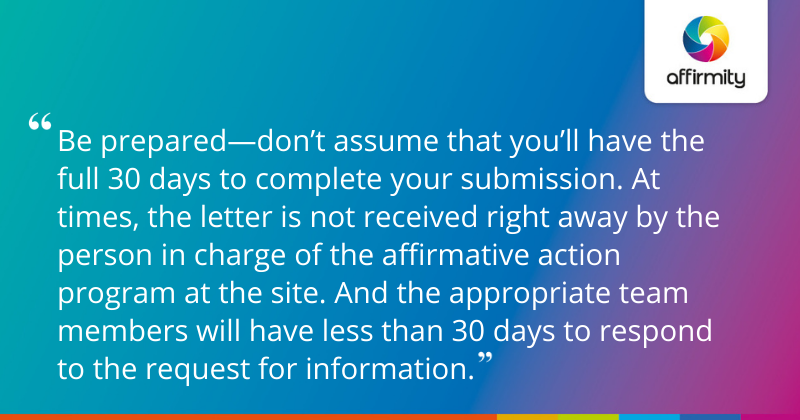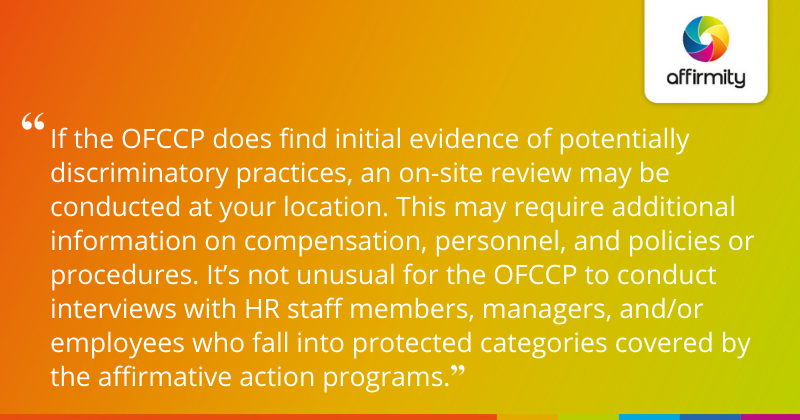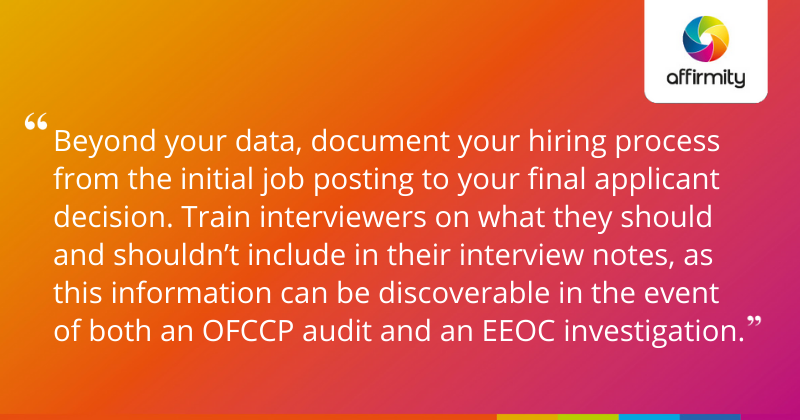If you are a federal contractor or a subcontractor, receiving an audit scheduling letter in the mail from the Office of Federal Contract Compliance Programs (OFCCP) may be one of your biggest fears. It’s easy to know enough about them to dread them, but do you really know what an OFCCP audit would entail? To help, we’ve put together this quick and easy guide to explain what you really need to know about this process and help you proactively prepare your organization.
What Are the Steps in a Compliance Audit?
Initially, you’ll be notified of your selection for an audit by a scheduling letter that will arrive in the mail. From notification, you have 30 days to provide the OFCCP with the materials requested in the itemized listing included in the scheduling letter.

1. OFCCP Audit Request and Initial Material Collection
Be prepared—don’t assume that you’ll have the full 30 days to complete your submission. At times, the letter is not received right away by the person in charge of the affirmative action program at the site. And the appropriate team members will have less than 30 days to respond to the request for information.
The OFCCP believes that contractors have sufficient time to prepare and update their AAPs in advance of an audit scheduling letter. Compliance reviews scheduled on or after September 7, 2018, follow OFCCP’s new policy for requesting extensions to submit their AAPs and supporting data.
But if you’re going to request an extension, you must make the request prior to the submission date for OFCCP consideration. The OFCCP normally doesn’t grant extension for requests after the submission date. The policy includes basic requirements for a 30-day extension—contractors must:
- Request an extension prior to the initial 30-day due date for AAPs.
- Submit the basic EO 11246, Section 503, and VEVRAA AAPs within the 30-day period after receiving the Scheduling Letter and Itemized Listing.
A software solution such as Affirmity’s Complete Resource Center (CRC) can help you manage AAP-related documents and keep track of those all-important Good Faith Efforts. This will help you proactively prepare for an OFCCP audit.
LEARN MORE ABOUT GOOD FAITH EFFORTS | ‘The Why, How, and What of Good Faith Efforts: Why GFEs Are Important‘
2. OFCCP Desk Audit
After submission, the OFCCP will conduct a desk audit of your submitted materials to search for any indicators of potential discrimination in your initial documentation. And will determine if an on-site audit review is required.
A full desk audit is a comprehensive analysis of all of a contractor’s written AAPS—Executive Order 11246 (EO 11246), Section 503 of the Rehabilitation Act of 1973 (Section 503), and the Vietnam Era Veterans Readjustment Assistance Act of 1974 (VEVRAA), plus supporting documentation. These analyses include, but are not limited to
- Impact ratio analysis
- Compensation analysis
- Reviews of outreach and recruiting
- Assessments of the reasonableness and acceptability of each AAP.
MORE FROM THE BLOG | ‘3 Reasons to Monitor Your Affirmative Action Plan (And 3 Ways to Do It Well)‘

3. Potential On-Site Audit
If all goes well, the desk audit will be closed and you will receive a letter indicating that no violations were present. Moving forward, the location audited won’t be open to another audit for two years.
However, if the OFCCP does find initial evidence of potentially discriminatory practices during the desk audit, an on-site review may be conducted at your location.
During this process, they will conduct a more detailed analysis, which may require additional information on compensation, personnel, and policies or procedures. And it’s not unusual for the OFCCP to conduct interviews with HR staff members, managers, and/or employees who fall into protected categories covered by the affirmative action programs.
What is the OFCCP Looking for During a Compliance Audit?
Beyond statistical and anecdotal evidence of discrimination, indicators of potential discrimination/violation also include, but are not limited to, patterns of
- Individual discrimination
- Systemic discrimination
- Major technical violations, such as recordkeeping deficiencies or failure to maintain an AAP
- Noncompliance with other labor and employment laws that may relate to violations of the laws enforced by OFCCP.
The OFCCP is currently focusing on pay equity, investing additional resources and processes to analyze a contractor’s pay practices more thoroughly. These efforts align with the administration’s focus on eliminating gender pay differences.
In addition to pay equity, OFCCP’s audit focus has shifted more to Section 503 and VEVRAA affirmative action plans. Contractors should pay more attention to obligations required by both regulations, including recordkeeping requirements and the annual evaluation process. This focus on Compensation and Pay Equity Analysis allows organizations to better mitigate risk and foster equity.
EVEN MORE ON AAPs | ‘4 Key Components of an Affirmative Action Program‘

How Can I Prepare My Organization for an OFCCP Audit?
Contractors should be aware of and understand the OFCCP’s priorities, such as its focus on the way disability and religious accommodation requests from applicants and employees are handled.
In addition, the EEOC and OFCCP have a Memorandum of understanding (MOU) to share information, so EEO complaints may indirectly trigger an audit.
Maintaining employee data, including race and gender, is also key. You’ll need to collect data consistently and ensure that EEO-1 codes are regularly reviewed and accurate.
Beyond your data, document your hiring process from the initial job posting to your final applicant decision. Train interviewers on what they should and shouldn’t include in their interview notes, as this information can be discoverable in the event of both an OFCCP audit and an EEOC investigation.
Conciliation agreements can result in thousands or even millions of dollars in back pay and other financial reparations. You can avoid these costs through strong attention to detail and further safeguarding exercises like completing an Audit Readiness Checklist.
Are your AAPs audit-ready? Comply with confidence with Affirmity’s OFCCP audit support services.
 About the Author
About the Author
Zoe Ann Whitley, PHR, is a Director of Consulting Services at Affirmity. In this role she leads and manages a team of Affirmity consultants who provide audit support and consulting on affirmative action, equal employment opportunity, and diversity. She has over 20 years of compliance experience, including serving as a compliance manager for a large federal contractor.
Ms. Whitley’s experience spans US and Canadian compliance, affirmative action, employee relations, recruitment, diversity, and training. With her deep expertise in this industry, she is regularly relied upon to provide guidance to the Affirmity auditing team and to participate in executive briefings and client training.
